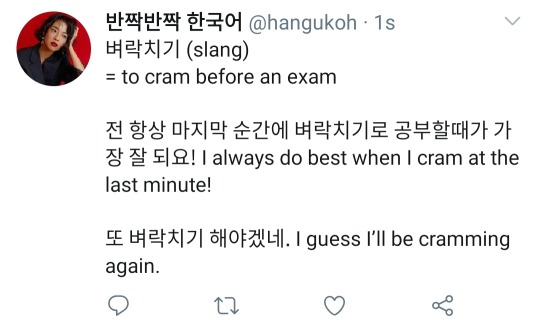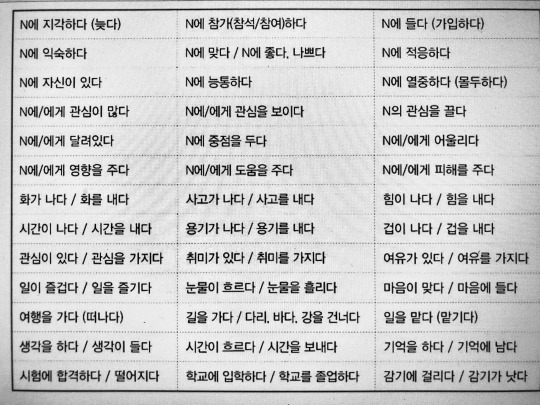Text
N+치고(는)
1. N+치고
— is used to indicate that the preceding statement is the same as the following statement without an exception.
동물울 좋아하는 사람치고 나쁜 사람을 본 적이 없어요. When it comes to people who love animals, I've never met a bad one.
요즘 대학생치고 취업 걱정을 안 하는 사람이 있을까요? For today's university students, is there anyone who doesn't worry about work?
학생치고 방학 싫어하는 사람은 없을 거예요. For students, there is no one who does not like holidays.
인기 있는 가수치고 연기 안 하는 사람은 없는 것 같아요. Talking about famous singers, It seems that there is anyone who doesn't act.
부모님치고 아이 걱정 안 하는 사람은 없을 거예요. There is no parent who doesn't care about their children.
2. N+치고는
— used to indicate that the following statement is an exception to the previous statement.
오늘은 봄 날씨치고는 꽤 쌀쌀한 편이에요. It's pretty chilly today for spring weather.
어제 놀이공원에 갔는데 휴일치고는 사람이 별로 없었어요. I went to the amusement park yesterday, but for a holiday, there were not many people.
외국인치고는 한국말을 아주 잘해서 다른 한국 사람인 줄 알았어요. For a foreigner, he spoke Korean very well, so I thought he was another Korean.
#korean blog#korean#korean language#study korean#learn korean#korean grammar#한국말#한국어#한국어 배우기#한국어 공부하기#한국어공부중#한국
85 notes
·
View notes
Note
Could you do a lesson on 겠지 and 아니겠지 when used as a question and as a statement?
There are a lot of grammar points in here, so I'll give you an index:
-겠다; intention, will / observation, supposition
-지(요)/죠?; right?, isn't it?
아니다; to not be
N(이/가) + 아니다 + 지요
아니다 + 겠다 + 지요
I sincerely apologize for the length of this post! There's a lot to unpack in just those two phrases, so I hope this helps.
1. -겠다; intention, will (1) / observation, supposition (2)
Phrases you’ll hear/know using -겠다:
(1) 잘 먹겠습니다 – I’ll eat well (aka: I intend to eat well)
(1) 뭐 드시겠습니까? – What will you eat? (높임말)
(1) 잘 하겠습니다 – I’ll do my best!
(2) 맛있겠습니다! – I suppose it is delicious
(2) 피곤하겠습니다 – I suppose you're tired
(2) 내일 비가 오겠습니다! - I suppose it's going to rain tomorrow
When to use -겠다:
Use it for yourself when you want to express first-person intent or will
If you do this, then remember that it’s more common and natural to use -겠다 with formal grammatical patterns (that’s why you see -(스)ㅂ니다 in all the examples)
This pattern also puts more emphasis on the intention than the simpler (으)ㄹ 것이다 future tense; if you use the -겠다 pattern, you mean it, essentially.
Use it when you want to make an observation towards someone or something else
Use it when inquiring about another person’s intent or will
All that said, you can use -(으)ㄹ 것이다 to express a future action in a less formal situation.
뭐 먹을 거야? (with friends) vs. 뭐 드시겠습니까? (as the server)
Note: you can use this pattern in lower formality situations (as an example, 힘들겠어; it seems difficult), it's completely okay! It's just more common to use -겠습니다 when talking about the intended future in a formal situation.
2. -지(요)/죠; right(?), isn't it?
This is used to ask for confirmation from the speaker about an observation! For us Canadians, this is the "eh?" we love so dearly. You can use this as a statement, to agree with the speaker. The difference between 지요 and 죠 is just pronunciation; they're the exact same thing. Examples:
춥죠? - it's cold, isn't it? (Canadian translation: it's cold, eh?)
외국인들은 한국에서 일하기 힘들지요? - it's hard for foreigners to work in Korea, right?
알고 있죠? - you know that, right?
당근이지 - right, of course! (informal)
3. 아니다; to not be
This is pretty self-explanatory. It's the opposite of 이다! When using this verb, make sure you use 이/가 particles! Here are some examples:
그 남자는 배우가 아니에요 - he's not an actor
학생이 아녜요! - I'm not a student
부자가 아니에요? - you're not rich?
4. N(이/가) + 아니다 + 지요
If we combine 아니다 and 지요 we can get sentences that express a negative statement to be confirmed. It's best to illustrate this with examples:
농담이 아니죠? - you're not joking, right?
부자가 아니지요? - you're not rich, are you?
한국인이 아니죠? - you're not Korean, right?
Note: when answering these questions, you have to answer the Korean way; we have to think of if we agree or disagree with the statement. Look here for examples.
5. 아니다 + 겠다 + 지요
Final grammar point! This is also pretty self-explanatory. As we know, -겠다 is used to express an observation or supposition. When we attach -지요, we are expressing that we need the listener to agree with our future observation. Examples:
-겠다 + 지요
쉽겠죠? - I suppose it's gonna be easy, right?
다음 주에 한국어 시험을 어렵겠죠? - The Korean test next week will be hard, right?
When adding 아니다 to 겠지(요)/죠, we are expressing a statement that we (the speaker) believe is a true observation.
Here are examples:
코로나 때문에 한국에 가는 게 아니겠죠? - you aren't going to Korea because of CoVid, right?
감기에 걸렸기 때문에 학교에 오는 게 아니었겠지요? - you didn't come to school because you caught a cold, right?
If you disagree with these statements, you are more than welcome to say so. The question/statement is just an observation that the speaker believes to be true. For example, you could say:
A: 코로나 때문에 한국에 가는 게 아니겠죠?
B: 아니요, 돈이 없어서 한국에 못 가거든요 - No (I disagree that it's because of CoVid), I can't go because I don't have money.
BONUS:
~(으)면 좋겠다; I hope ~
You can use this when you want to express the hopefulness of something. The literal translation is "it would be good if~". Here are some examples:
한국에 가면 좋겠어요 - I hope to go to Korea
잘됐으면 좋겠어요 - I hope it goes well
상을 타면 좋겠어요 - I hope I win a prize/award
Ooof!! Finally at the end! Hope this answered your question! As always, if there's anything that you still don't understand, you're more than welcome to send me a pm and we can sort it out together!
Happy Learning :)
~ SK101
#korean#korean blog#study korean#한국어#한국어 배우기#korean langblr#korean language#learn korean#한국어공부#korean language blog#klangblr#langblr#korean phrases#korean lesson#한국어 문법
178 notes
·
View notes
Text
MUST-KNOW 한자어: 大 - 대
大 크다 - 대
- big, great
대학 - university
대도시 - big city
대부분 - most (of), the greater part (of)
대가족 - large family
대중 - the public, mass
대형 - large size
대청소 - general house cleaning
최대 - the largest, maximum
위대하다 - great
거대하다 - huge, great, enormous
관대하다 - generous, tolerant
중대하다 - important (to/for), significant (for)

#한국어#한국어 연습#한국어 단어#한국어 배우기#한국어 공부하기#한국어 어휘#한국어 한자어#한자어#korean blog#korean#korean language#study korean#learn korean#south korea
286 notes
·
View notes
Text

웨딩 촬영 — 우크라이나 신부 🤍 한국 신랑
#한국생활#웨딩#웨딩사진#웨딩스튜디오#웨딩촬영#wedding#wedding pictures#wedding South Korea#Korean#south korea#seoultravel#Korea wedding#kpop#bts#blackpink#korean lanaguage#wedding design#wedding dress#aethstetic#wedding date
16 notes
·
View notes
Text
youtube
이거 꼭 보세요~ 진짜 너무 예뻐요! 😍
한국에 가 보고 싶은 분 “❤️” 누르세요~!
#korean language#korean#study korean#learn korean#한국어#한국#한국생활#Korea#South Korea#kpop#kdrama#I love Korea#living in Korea#южная Корея#кпоп#корейский язык#Youtube
11 notes
·
View notes
Text
Korean expression — 어찌할 바를 모르다
= to feel lost, to be at loss (on what to do)
많은 젊은이들이 어찌할 바를 모른다고 느낀다. A lot of young people feel lost.
신출귀몰하는 도둑 때문에 경찰은 어찌할 바를 몰랐다. The police didn't know what to do because the thief appeared and disappeared like a ghost.
183 notes
·
View notes
Text

여기는 속초라는 도시의 아침 조명이다.
아침마다 이렇게 바다를 볼 수 있으니 좋다.
#한국어#korean language#korean#study korean#learn korean#속초#한국#한국생활#life in korea#korean blog#바다#하늘#korean practice
61 notes
·
View notes
Text
Advanced Grammar: V느라고 V는데 (or V느라고 하는데)
"I do do V, but..." "Despite the fact that I..."
공부하느라고 하는데 성적이 안 느네요. I do study, but my grades aren't getting better.
자느라고 자는데 하루 종일 피곤해요. I do sleep, but I'm tired all day.
깨끗하게 하느라고 했는데 아직 좀 지저분하네. I did try hard to clean up, but it's still messy.
Note: some Koreans will tell you that the correct form of this is V노라고 V는데 because ~노라고 implies that the speaker has made an effort to do something. My teacher uses ~느라고 ~는데 and says it is correct though.
176 notes
·
View notes
Text
Korean neologism — 독박육아 vs. 공동육아

Source
독박육아 = single parenting. As in, having a child as a couple but only one person is taking care of them.
독박 육아가 이혼 사유가 될 수도 있다. Single parenting could be a reason for divorce.
공동육아 = co-parenting.
정부가 성공적인 공동 육아를 위한 지침을 마련했다. The government has come up with guidelines for successful co-parenting.
105 notes
·
View notes
Text
Word of the day: 꼬시다
1. to flirt
2. to incite sb to do smthg, to coax sb (ex. 테니스를 치자고 꼬셨어요 = He coaxed me into playing tennis).
#korean#한국#한국어#korean language#koreanblr#korean vocabulary#korean vocab#korean langblr#korean learning#learning korean#learn korean#한국말#한국어 배우기#한국어 공부#korean study#intermediate korean
245 notes
·
View notes
Text
성격과 기분 관련 어휘 및 표현
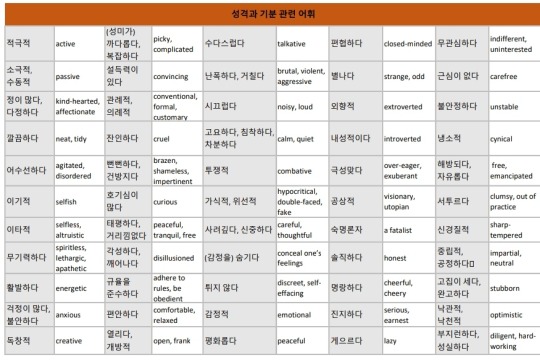

The spreadsheet was made by me. Please credit if you'd like to share it somewhere else. Click here for the PDF version.

읽기 연습 — Reading comprehension
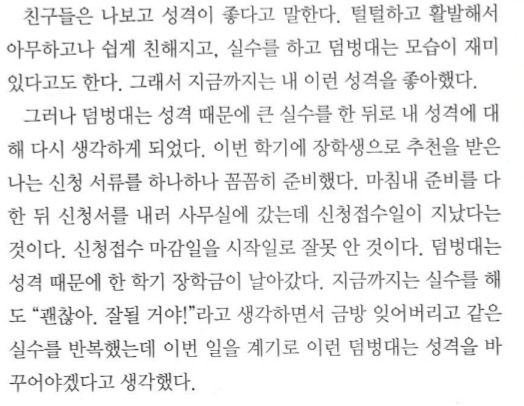
출처: 재미있는 한국어 3
#korean#한국어#한국#korean language#koreanblr#korean vocabulary#korean vocab#korea#korean langblr#korean study#한국말#한국어 배우기#한국어 공부#korean language study#learn korean#intermediate korean
329 notes
·
View notes
Text
List of MUST-KNOW Korean grammar

1. N에 대해(서) - about N
2. N(으)로 인해(서) - as a result of N
3. N에도 불구하고 - in spite of N
4. N에 비해(서) - compared to N
5. N에 비하면 - compared to N
6. N에 반해(서) - in contrast with N
7/9. N에 따라(서)(의해서)- in accordance with N
8. N에 따르면(의하면) - according to N
10. N와/과 달리 - unlike N
754 notes
·
View notes
Text
Book Genres
“ Hi! Do you think you can post some book genres in Korean? For example, how would you say to a friend that you’re reading a book that contains science fiction or a dramatic book?”
Best-seller 베스트셀러
Series 시리즈 (EX: “Goosebump 시리즈”)
Art Book 화보집/미술서
Autobiography 자서전
Biography 전기
Comic Book 만화책
Cook Book 요리책/조리서
Coloring Book 칠하기 그림책
Detective (Mystery) 추리 소설
Educational Book 교과서
Historical Book 역사(서)
Fantasy 환상
Fiction 소설
Horror 공포 소설
Language Study Book 어학 교재
Memorandum (“Memo”) Book 비망록
Auxiliary Book 보조부
Mystery 미스테리 책
Nonfiction 논픽션, 실화
Poetry Book 시집
Poetry 시
Science fiction - 공상 과학 - but you can also just say SF like you do in English
Self-Help Book 자습서, 자립 안내서.
A Korean language as a foreign language learning book 외국어로서의 한국어 교재
Korean grammar book 한국어 교육 문법서
Conversation book 회화 교육교재
3K notes
·
View notes
Photo
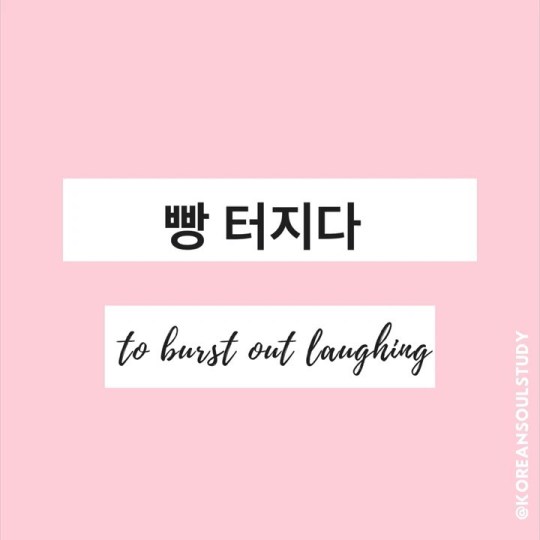
빵 터지다 ~ to burst out laughing
(빵- bread)
빵- the sound produced when an object explodes, bursts
터지다- to explode, burst, pop
This is a Korean slang.
I try to think of it being similar to how we say “I’m dying/ I’m dead” when something is really funny.
Ex: if you show your friend a funny gif you can say “빵 터지다” - thats so funny, I’m dying (of laughter), I’m cracking up
빵 터졌어- I’m cracking up, I’m laughing
저의 아빠가 빵 터졌어요- my dad was laughing/cracking up
그 드라마 보고 빵 터졌어요- that drama made me burst out in laughter
Pic: remember this phrase by picturing bread exploding hahahaha 🥖🍞💥💥
#korean #korea #koreanlanguage #koreanstudy #koreanlearning #language #koreanwords #koreangrammar #koreansoul #koreansoulstudy #studygram #studyinspo #한국어공부 #한국어 #한국말 #한국말공부 #studygram #studyingkorean #learnkoreanlanguage #koreanvocab #koreanvocabulary #koreanaesthetic #koreans #koreanculture #koreangirl #한국어배우기 #한국어를 (at Koreatown)
https://www.instagram.com/p/B8xLfhsBXgP/?igshid=fmllnv2rupem
#korean#korea#koreanlanguage#koreanstudy#koreanlearning#language#koreanwords#koreangrammar#koreansoul#koreansoulstudy#studygram#studyinspo#한국어공부#한국말#한국어#한국말공부#studyingkorean#learnkoreanlanguage#koreanvocab#koreanvocabulary#koreanaesthetic#koreans#koreanculture#koreangirl#한국어배우기
166 notes
·
View notes
Text
Word of the day: 당
= per, each.
예문
한 사람당 종이 한 장이에요. It's one paper per person.
방값은 1인당 1박에 50유로다. The room is 50 euros per room, per night.
눈이 시간당 4센티미터 정도로 내렸다. The snow fell at a rate of 4 centimeters per hour.
#korean#한국어#한국#korean language#koreanblr#korean vocabulary#korean vocab#korean langblr#korea#korean word of the day#korean wotd#한국말#한국어 배우기#한국어 공부하기
150 notes
·
View notes
